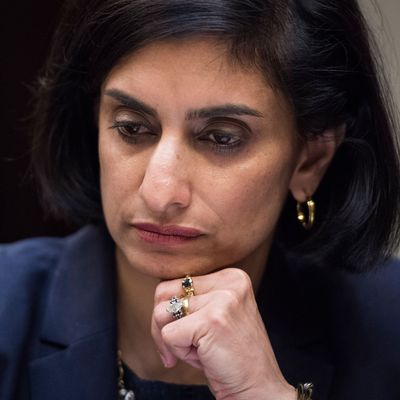
One of the hallmarks of latter-day conservative thinking about the Medicaid program (and for that matter, the Medicare program) is a tendency to deny any intention of fundamentally changing it even while supporting “reforms” that fundamentally change it. For example: the Medicaid “block grants” that Republicans have been pursuing for years (most recently in the failed 2017 proposals to repeal and replace Obamacare) wouldn’t abolish the program, but they would make it unrecognizable over time as states made drastic changing in benefits and eligibility to stay under budget.
Knowing the bad intent the Trump administration and its congressional allies bring to bear toward Medicaid and the great big green light they’ve held up to states that want to mess with it, it’s important to know exactly how far Team Trump will go using its own waiver authority. And now we know there is at least one line they won’t cross: an arbitrary time-limit on eligibility for Medicaid, which they’ve just denied Kansas (with Arizona and Utah in line to request something similar.) It was a proposed three-year limit, which is two years less than the limit on cash public assistance Congress enacted in 1996.
Federal Medicaid/Medicare administrator Seema Verma was reasonably clear about the idea of showing people with medical needs and severe financial limitations the door so quickly and universally:
We seek to create a pathway out of poverty, but we also understand that people’s circumstances change, and we must ensure that our programs are sustainable and available to them when they need and qualify for them.
The upshot is that requirements for Medicaid beneficiaries that can be justified as helping them get out of poverty — like the Medicaid work requirements the administration is now routinely approving — are okay, but just dumping people out of the program no matter what their circumstances might be is not. It’s no coincidence that the same day Verma denied the Kansas waiver, she made New Hampshire the fourth state to receive a Medicaid waiver for work requirements.
It’s not entirely clear why the administration was not willing to push the envelope with time limits. It might reflect an awareness that Medicaid benefits an awful lot of those non-college-educated white voters who are Donald Trump’s core constituency. Intentions aside, the odds of a hard time-limit surviving the immediate lawsuits that would arise are pretty low. After all, it took a momentous act of Congress to impose time limits on cash assistance. The idea that the executive branch could do the same with respect to the much larger and vastly more popular Medicaid program via some waiver designed to promote “innovation” never made a lot of sense.
The idea could come back in legislative form, of course, as part of or in conjunction with a block grant plan or some other means of ending Medicaid as we know it. For now, it remains a twinkle in the eye of conservatives who think you best help the poor and impoverished by leaving them to their own meager resources.






























